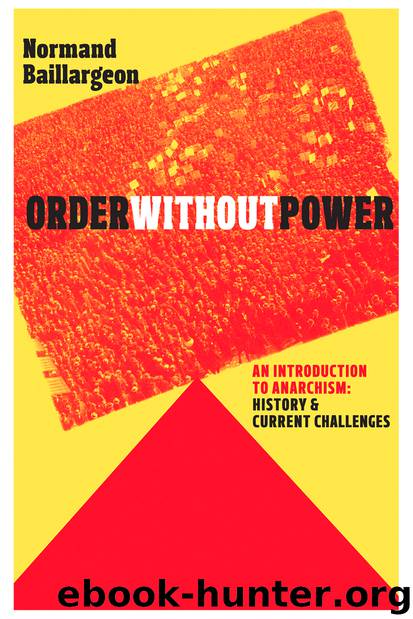Order Without Power by Normand Baillargeon

Author:Normand Baillargeon
Language: eng
Format: epub
Tags: anarchy, anarchism, william godwin, rationalism, max stirner, egoism, associationism, pierre-joseph proudhon, mutualism, bakunin, federalism, peter kropotkin, anarcho-communism, noam chomsky, international workers' association, haymarket massacre, russian revolution, spanish civil war, anarcho-syndicalism, ecology, education, media, ethics, anarcho-feminism, anarcho-capitalism
Publisher: Seven Stories Press
Published: 2013-09-30T16:00:00+00:00
The Spanish Civil War (1936–1939)
Much has been written about the Spanish Civil War. It should be acknowledged that a substantial part of this literature is based on propaganda and falsification from all sides. However, sixty years after these terrible events, there is general agreement on key aspects, allowing for an understanding of the origins and unfolding of the war, as well as the part played by anarchists.
First a few facts indispensable to understanding all of the complexities of these events: In 1936, Spain, still suffering the severe effects of the 1929 economic crisis, was a largely agrarian country struggling through a process of industrialization. Some 675,000 of the 80 million inhabitants were unemployed. The country was troubled by numerous and very deep political, ideological, and economic conflicts. Its oligarchy hobnobbed with a powerful church and could rely on the support of a large army that had an appetite for pronunciamientos (military coups d’état).
On the other side were grassroots and labor movements predominantly influenced by anarchism. Unlike elsewhere, where authoritarian communist or reformist social-democratic tenets and parties ultimately prevailed, the Spanish labor movement was still shaped by the ideas and practices of Bakunin and anarcho-syndicalism. The large-scale anarchist experiment occasioned by the Spanish Civil War had thus been long in preparation. In 1936, the anarcho-syndicalist CNT was the largest union in Spain. It had more than a million and a half members, and its spirit and driving force was the Federacion anarquista Iberica (FAI) (Iberian Anarchist Federation).
The elections of February 18, 1936, brought in a leftist coalition, the Frente Popular. Three factors helped bring about this victory. First, the agrarian reforms undertaken by the previous government failed; second, the leftist coalition promised a political amnesty; and finally, though no less significantly, the anarchists launched a call to vote for the Frente Popular (although, as we might guess, they did not participate in the coalition). In sum, Spain was divided into two irreconcilably opposed camps, with conflicts crystallizing along the dividing line: on one side, a left that included republicans, socialists, communists, and anarchists; on the other, a right consisting of oligarchs, Carlists, royalists, Catholics, and the Falange of José Antonio Primo de Rivera, with the backing of a mighty and loyal army.
The government began to implement its program in a troubled, tense context. On June 16, the monarchist leader Jose Calvo Sotelo delivered a famous speech: “Against this sterile state, I propose the integral state. Many will call it fascist. But if the fascist state means an end to strikes, an end to disorder, an end to property abuse, then I am proud to call myself a fascist. I count any soldier crazy who is not prepared before eternity to stand up to anarchy if it is necessary.”
The situation became extremely tense when Sotelo was assassinated on July 13. His death triggered el alzamiento on July 17 in Melilla—a military uprising that had been in preparation for some weeks. Francisco Franco left the Canary Islands and assumed command of the troops from Morocco.
Download
This site does not store any files on its server. We only index and link to content provided by other sites. Please contact the content providers to delete copyright contents if any and email us, we'll remove relevant links or contents immediately.
| Anarchism | Communism & Socialism |
| Conservatism & Liberalism | Democracy |
| Fascism | Libertarianism |
| Nationalism | Radicalism |
| Utopian |
The Secret History by Donna Tartt(19011)
The Social Justice Warrior Handbook by Lisa De Pasquale(12179)
Thirteen Reasons Why by Jay Asher(8878)
This Is How You Lose Her by Junot Diaz(6866)
Weapons of Math Destruction by Cathy O'Neil(6253)
Zero to One by Peter Thiel(5778)
Beartown by Fredrik Backman(5723)
The Myth of the Strong Leader by Archie Brown(5488)
The Fire Next Time by James Baldwin(5418)
How Democracies Die by Steven Levitsky & Daniel Ziblatt(5207)
Promise Me, Dad by Joe Biden(5137)
Stone's Rules by Roger Stone(5071)
A Higher Loyalty: Truth, Lies, and Leadership by James Comey(4942)
100 Deadly Skills by Clint Emerson(4907)
Rise and Kill First by Ronen Bergman(4766)
Secrecy World by Jake Bernstein(4735)
The David Icke Guide to the Global Conspiracy (and how to end it) by David Icke(4693)
The Farm by Tom Rob Smith(4496)
The Doomsday Machine by Daniel Ellsberg(4477)
